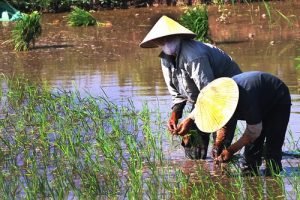
This Photo by Unknown Author is licensed under CC BY-SA-NC
Under what conditions can open learning engage students living under poverty and have the potential to empower them to improve their lives? Inspired by the article “Framing Open Educational Practices from a Social Justice Perspective” by Bali et al. (2020) I looked into how open and internet supported learning could be used as a tool for poverty reduction. After all, we have been told for centuries that education is essential to in poverty reduction efforts. I looked around in the literature and found a program that helped farmers to learn more about how to improve their crops in a pilot project in Vietnam (Materi & Fahy, 2004). The program provided an internet program for farmers that could attend a computer centre and get the lessons there, since they did not have access to internet or computers at home. The program helped the farmers not only to learn the specific issues related to farming, but they also got new abilities to use the internet that was provided to them.
But how can we evaluate open educational practices in relation regarding their potential for poverty reduction? Are we talking about poverty in terms of economic assets or do we have a more comprehensive definition of poverty that includes ability to participate in society, establish networks and influence the political decisions affecting one live?
I used the framework presented in the article by Bali et al. (2020) that invites to see into the entire process of open learning and not simply the practices. By focusing on the process there is more attention to learner-centred practices that allow for participation and dialogue which can in turn be transformative. The able below is my attempt to evaluate the case of Vietnam using the Bali et al. (2020) framework. It shows that the process can go in different directions and the importance to allow for citizens to decide and to be able to use open learning in the context of justice making.
| Open educational practice | Context for it may be neutral or negative | Context for which it may be ameliorative | Context for which it may be transformative |
| Internet-based programs for adult education in community centers
(Content-centric / learner centric) |
Negative if the content is not relevant, if not transformative, if students are not able to provide feedback. In the case of farmers in Vietnam, if they only learn one type of agriculture that does not take into account their traditional knowledge or their needs. | It can help students when the need for learning is specific and linked to their needs.
If they can get help about controlling pests, about weather forecast, about how to improve their harvest, about better access to markets. |
When there are possibilities for students to form organizations, to participate in the selection of modules, to be able to use the internet beyond the learning process, to be able to form associations
and be able to participate in local politics.
In the case of Vietnam, if the farmers could form a cooperative to be able access markets and improve their income, to be able to participate in politics beyond the training, access other services (health, child care for women to be able to take the courses). |
So, if open education has such big potential, why is not more widely used? After the discussions in my group, I realised how many teachers are afraid about sharing, there is a believe that what cost me effort should not be given away without any compensation. Still I wonder if we already got paid by our time by tax-payers money, why not share and allow for more wealth to be created and re-distributed. It is not an easy case.
I guess it is not that easy. I checked the Lund University strategic plan (2017-2026), but couldn’t find anything about openness. The word open is mentioned only two times, first in relation to having an “open and creative atmosphere” and second about “open research findings. So I guess we are still far from achieving the full potential of open learning. https://www.lunduniversity.lu.se/sites/www.lunduniversity.lu.se/files/strategic_plan_2017-2026-updated030517.pdf
For open learning to be truly empowering and transformative, there is a need to let go by many actors and organisations that still want to have control over the process and results of education.
Leave a Reply